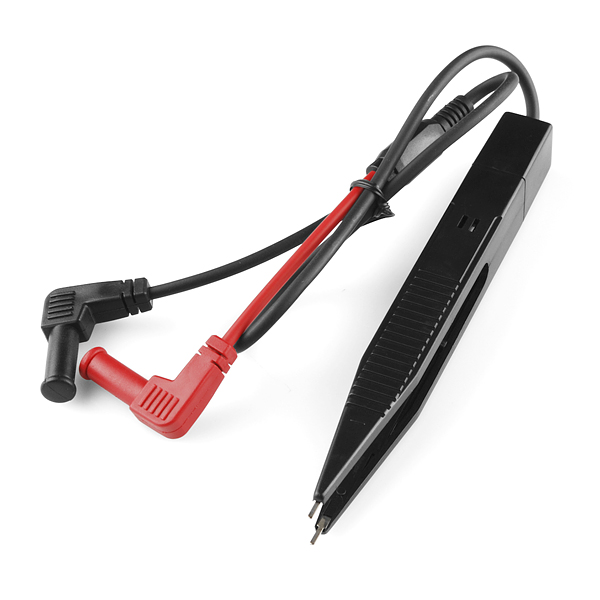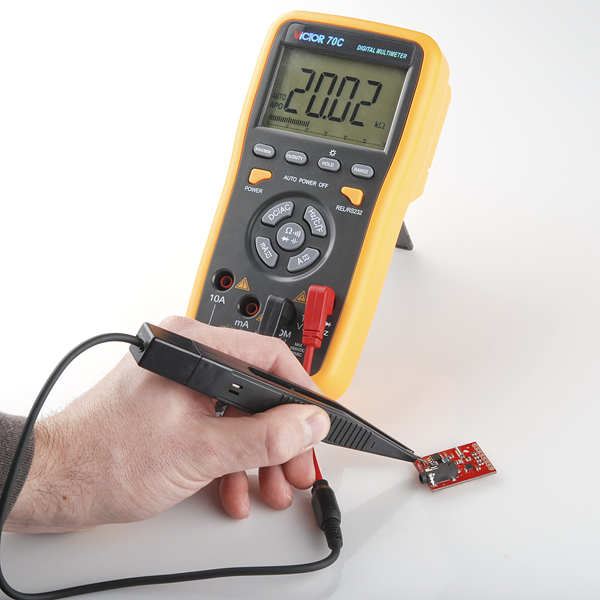Multimeter Probes - Tweezers
Testing surface-mount components with standard test leads is anything but easy. Everyone has their own method: some people tackle it with teamwork and have a friend (or grad student) hold the probes, some people have adapted a sort of chopsticks-like technique, but the best way by far is probably just to buy these handy tweezer probes! Tweezer probes connect to your existing instrumentation with shrouded banana connectors and allow you to easily test small parts with one hand. The large plastic tweezers are easy to grip and are marked for polarity.
- Tweezers are 6" long with 10mm open clip distance. Wire lead is 16" from tweezers to jacks.
Multimeter Probes - Tweezers Product Help and Resources
How to Use a Multimeter
January 9, 2015
Learn the basics of using a multimeter to measure continuity, voltage, resistance and current.
Core Skill: Electrical Prototyping
If it requires power, you need to know how much, what all the pins do, and how to hook it up. You may need to reference datasheets, schematics, and know the ins and outs of electronics.
Skill Level: Rookie - You may be required to know a bit more about the component, such as orientation, or how to hook it up, in addition to power requirements. You will need to understand polarized components.
See all skill levels
Comments
Looking for answers to technical questions?
We welcome your comments and suggestions below. However, if you are looking for solutions to technical questions please see our Technical Assistance page.
Customer Reviews
3.6 out of 5
Based on 5 ratings:
1 of 1 found this helpful:
What A Tool!
If you do any surface mounting this tool is a must. I plan to mention it in another article I'm writing for Nuts and Volts July issue regarding building of "FIREWORKS" earrings. The earrings use 805s & 603s surface mount components. When the tweezers are connected to the "diode" mode of a DVM they will fire up the led and tell you where the cathode is. When connected to the "ohm" mode they will tell the resistance of a resistor. When used with a capacitance meter you can sort capacitors. Great for on the board checking also.
Broken on Arrival
You get what you pay for. These are very cheaply made and arrived with a bad internal connection. Flimsy plastic. If you want a quality tool, keep looking.
Hi, If you are not satisfied with your part, please don't hesitate to contact us via our Returns page -- https://www.sparkfun.com/returns I have emailed you about this issue. We'll get you taken care of.
Great value
These make it very easy to measure voltage with only one hand. They're kind of cheaply made, but a great deal for $5. I'd love to buy a $10 or $15 version with quality to match.
They work, more or less
They are big - bigger than needed for surface mount parts. That leads to more C or L to null out when measuring low value parts. But they work. The tips are soft. You must short them together to calibrate an inductor reading - but if you use too much force the tips bend. A sturdier material, but with a high conductivity, wear resistant coating would be a better design.
Nice Item
I use these for checking caps on PC boards. They work as expected. Yeah Sparkfun!



Holy hell I've been wanting something like this for so long! Holding those obnoxious multimeter probes is such a chore and their damn cords keep getting tangled.
When I worked as a repair tech, I often had a pcb for repair that had an excess of 50 micro relays on board, each needed to be tested and replaced if defective. I used something similar to these tweezers for my bench meter and power supply so i could power each relay individually with one have and probe the contacts with the other, these are absolutely a much have for the home bench, they will come in handy!
(The sets I used were about $50 a pair though, with interchangeable tips)
I think I ordered this exact thing on deal extreme a couple years back.
The test points were flimsy, and prone to becoming misaligned or otherwise useless.
The probe tips are made of soft metal so they are easy to bend, and they are not [easily] replaceable. The actual probe tip measurements are 0.375" (9.5mm) between tips and each tip is 0.050 (1.27mm) wide by 0.016 (.41mm) thick by 0.20" (5mm) long. The cable length from the probe handle to the jacks is 16.5". A great tool for probing SMT parts and lighting up SMT LEDs. Buy 2 of these so you will have a spare for when the tips wear out (they will eventually break off due to bending and straightening).
They look pretty small (check the zoom photo, at 10mm between those tips I'd estimate them to be 0.2mm thick and <1mm wide) but they also look capable of probing tiny components.
IC pin hooks, test probes, chip clips, and the like are notoriously flimsy. However, they're not designed to be your day-in, day-out measuring tools that kick around your desk. They're designed to be awesome when you really need to probe a tiny SMD component. And they are. Buy a couple in case one breaks.
you can easily measure a 0603 SMD resistor or cap with these. not good for ICs really though.
For $5, they're worth every penny. Just realize, they're $5... they aren't going to be 'precision', but will work for most things.
If you buy 10 or more there only $4.46. . . X)
I have an old Fluke DM252 that has regular (not shrouded) banana plugs on the leads. Is there any way I can get these to work?
Take a knife to the jacket.
These work with TOL-09141 right?
Yes, they do.